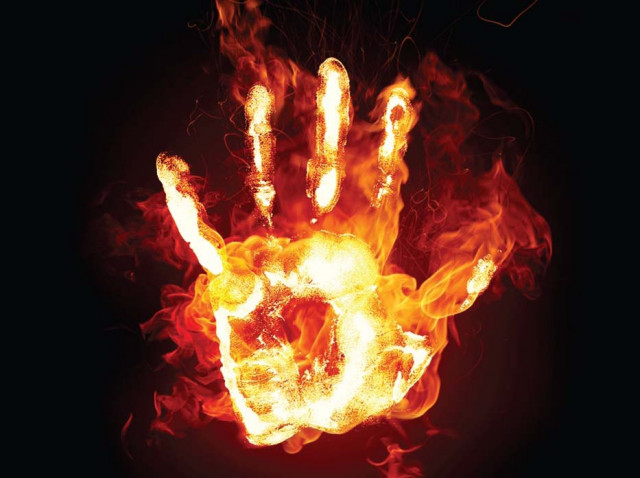A suicide in front of Parliament
Khan's suicide gives a stark message and reflects the plight faced by the majority of the population in the country.

The message is stark and reflects the plight currently being faced by the majority of the population in the country. Suicides take place in the most prosperous societies too, but this one is more significant because it offers commentary on the state of Pakistan after 64 years of its existence. This is not about the depression of a single individual that has forced him to give up his life. Rather it points to the collective despondency at the ‘abnormal’ state of Pakistan.
Raja Khan’s message is shocking because it is undramatic: he was honest in the pursuit of his duties of looking after his children and was rendered helpless because he could not find employment in an economy that is going through a dangerous contraction, squeezing thousands of people out of their jobs every day. The poor are shaped by certain conditions of life: they have no savings and live from day to day and are a class which suffers when the economy goes downhill.
Suicides are not unknown to Pakistan’s unjust society. The injustice faced by certain groups may not be economic in origin. Suicide is linked to depression or a depressive state of mind. Women are prone to be being depressive in a society like Pakistan because the law doesn’t protect them against maltreatment. The non-Muslims of Pakistan and certain persecuted Muslim minority groups are in the same boat because they too face the same kind of difficulties. But the consequences of an economic disaster are faced by nearly 70 per cent of the population and hence the increasing number of suicides brought on by economic deprivation and poverty.
Although it is a cliché to say this is the worst of times, by all calculations the period we are going through now is among the worst in the country’s history. The state is dysfunctional on many counts. But there are other reasons to consider.
There is terrorism emanating from the past policy of using cross-border violence through non-state actors and fighting ‘deniable’ jihad with international terrorists. This trouble is of long gestation, dictated by a military-dominated establishment while the civilian governments fell like nine pins over the past three decades. Today, as we face the fallout from a worldwide economic crisis, we are made to recognise that the country lacks internal economic strength to survive the global capitalist ‘boom and bust’ cycle. The most outstanding direct cause of the falling apart of the economy is the energy crisis with its origin buried in the state’s lack of consensus about its identity and future direction. Then there is the circular debt handed down by the Musharraf government because it didn’t want to pass on the rising cost of the fuel that produces electricity to the populace just before the anticipated elections. After that there is the sad history of the PPP-led government’s handling of this inheritance.
The energy crunch is one of the primary causes of unemployment of the poor. In the cities, the laid-off manpower is growing by the day, joining the ranks of Raja Khans. In the countryside, subsistence has been destroyed by natural calamities which the governments in the provinces simply could not cope with. The poverty of the rural man driven to the urban centres is more crushing than normal poverty. Add to this the isolationist course adopted by our politicians and the military and you have the prescription of a state collapse. Will it be like Somalia or Tunisia? Or Egypt, or even Libya?
A point to note is that the ‘revolution’ in the Arab state is against dictators; in Pakistan pressure-releasing mechanisms like political parties and elected governments are in place. In fact, if at all there is a revolution in Pakistan, it is possible that it may be commandeered by religious and conservative forces for its own ends and that will not be a good outcome for the state or its people.
Published in The Express Tribune, October 26th, 2011.















COMMENTS
Comments are moderated and generally will be posted if they are on-topic and not abusive.
For more information, please see our Comments FAQ